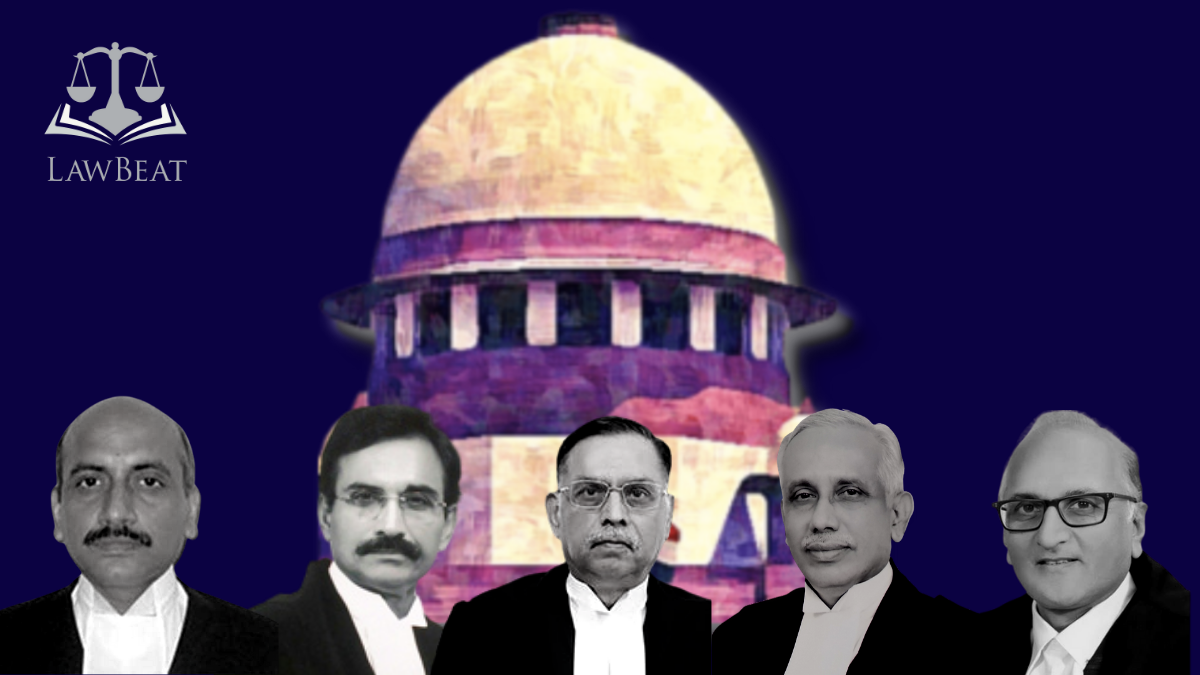No Exceptional Case Made Out To Exceed The Ceiling Limit Of 50% : Supreme Court Strikes Down Impugned Provisions Of The Maharashtra SEBC Act, 2018

Supreme Court delivered its verdict on the validity of the Maharashtra State Reservation for Socially and Educationally Backward Classes (SEBC) Act, 2018.
The Five Judge Constitution Bench comprising Justice Hemant Gupta, Justice Nageswara Rao, Justice Ashok Bhushan, Justice S. Abdul Nazeer and Justice Ravindra Bhat have unanimously held that no exceptional case was made out for exceeding the ceiling limit of 50% in favour of the Marathas.
- With regards to Questions 1, 2 and 3, unanimous agreement of the entire bench.
- The bench reiterated Indira Sawhney Para 809, 810; “There is no case of exceeding the limit of 50% to grant reservation to the Marathas.”
- Section 2(j) of the Maharashtra (SEBC) Act, ultra vires and struck down; Section 4(1)(a) granting 12% reservation ultra vires and struck down; Section 4(1)(b) granting 13% reservation in service ultra vires and struck down. Admission in PG Medical Courses, not affected.
- Indira Sawhney does not require to be referred to a larger bench.
- In the task of identification of SEBCs, decision to be taken by the President by the assistance of the State under Article 342A(1)
- Quantum of reservation granted by the State, except for identification remains undisturbed.
Constitutionality of Maharashtra State Reservation (of Seats for admissions in Educational Institutions in the State and appointments in the Public Services and posts under the State) for Socially and Educationally Backward Classes (SEBC) Act, 2018 (“Impugned Act”) was under challenge.
In the present matter, the Impugned Act u/s 4 allowed reservation upto 16% in Educational Institutions (including private educational institutions) and 16% indirect appointment to public services and posts under the State. The Bombay High Court, while upholding the Constitutionality of the Impugned Act, reduced the quantum from 16% to 12% in respect of Reservation to educational institutions and 13% in public employment.
Thereafter, the Appellants assailing the judgement of the Bombay High Court approached the Supreme Court where a Full Judge Bench comprising Justice Nageswara Rao, Justice Hemant Gupta & Justice Ravindra Bhat, while passing interim directions and staying the operation of law on September 9, 2020, referred the matter to a Larger Bench.
Broad issues considered by the Bench:
1. Whether judgment in case of Indra Sawhney v. Union of India [1992 Suppl. (3) SCC 217] needs to be referred to larger bench or require re-look by the larger bench in the light of subsequent Constitutional Amendments, judgments and changed social dynamics of the society etc.?
2. Whether Maharashtra State Reservation (of seats for admission in educational institutions in the State and for appointments in the public services and posts under the State) for Socially and Educationally Backward Classes (SEBC) Act, 2018 as amended in 2019 granting 12% and 13% reservation for Maratha community in addition to 50% social reservation is covered by exceptional circumstances as contemplated by Constitution Bench in Indra Sawhney’s case?
3. Whether the State Government on the strength of Maharashtra State Backward Commission Report chaired by M.C. Gaikwad has made out a case of existence of extraordinary situation and exceptional circumstances in the State to fall within the exception carved out in the judgment of Indra Sawhney?
4. Whether the Constitution One Hundred and Second Amendment deprives the State Legislature of its power to enact a legislation determining the socially and economically backward classes and conferring the benefits on the said community under its enabling power?
5. Whether, States power to legislate in relation to “any backward class” under Articles 15(4) and 16(4) is anyway abridged by Article 342(A) read with Article 366(26c) of the Constitution of India?
6. Whether Article 342A of the Constitution abrogates States power to legislate or classify in respect of “any backward class of citizens” and thereby affects the federal policy / structure of the Constitution of India?
